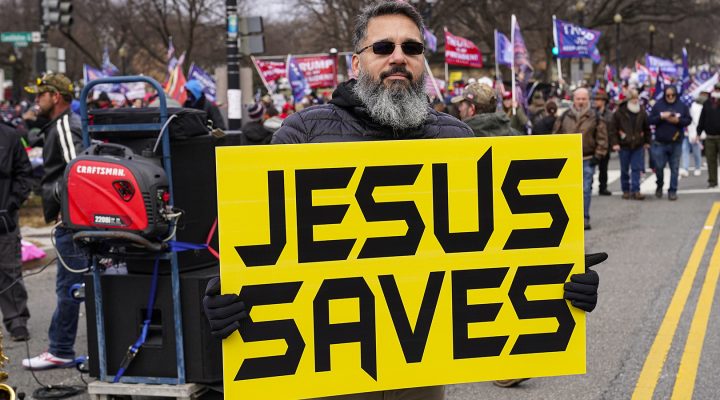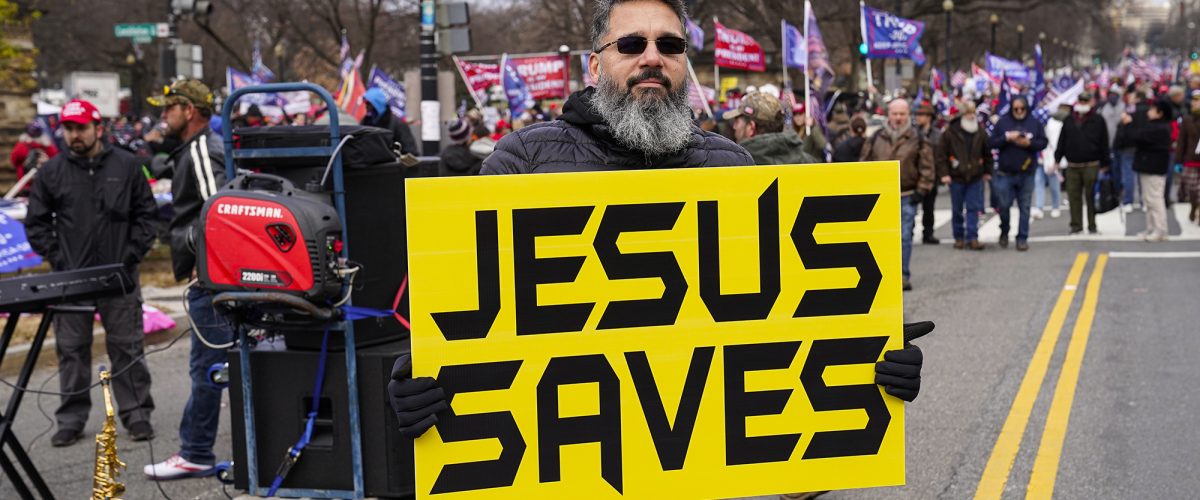In this politically fraught time, communities of faith have a unique opportunity to speak truth into the chaos. This necessarily means addressing the religious nationalism that burst from the shadows into public view on January 6, 2021.
Regardless the outcome of the November election, the fight against Christian nationalism will not end when a new president is inaugurated. It’s therefore helpful for Christian laity to know where their own denominations are in the journey to addressing this very real threat to faith and democracy.
There are numerous individuals (both clergy and laity) as well as congregations within larger denominations active in the fight to counter the dangerous push to turn the United States into a specific kind of “Christian” nation. In some cases, these individuals and communities are ahead of where their larger denominations are in speaking boldly and prophetically against the idolatry of Christian nationalism.
“Some Mainline Protestant denominations have been at the forefront; others have slow-walked engaging in this conversation.”
Without question, some Mainline Protestant denominations have been at the forefront in equipping and inspiring their congregations to address this issue. But others have slow-walked engaging in this conversation.
Churches that are Mainline Protestant tend to be more theologically moderate and nonevangelical (meaning they view “conversion” differently). They also are defined by their ecumenical posture within the larger Christian tradition.
Included in the analysis that follows are the 13 denominations, categorized as “Mainline Protestant” by Pew Research Center and cross-referenced against the membership list of the National Council of the Churches of Christ in the USA — an ecumenical organization of which many Mainline denominations are a part. The 13 Mainline denominations included are diverse in their polity, membership numbers and budgets, so invariably there are differences between their capacity and methods for engaging with the issue of Christian nationalism in the public square.
Since Christian nationalism is a uniquely American problem, only U.S.-based denominations are included in this analysis. And since the problem with Christian nationalism is a uniquely white American problem, denominations within the historically Black Protestant tradition are not included.
There is power in numbers. It is therefore helpful for individual laity and congregations to know how their larger denomination has shown up to (or been absent from) the fight against Christian nationalism.
My hope is that this information will motivate laity, clergy and denominational leaders to take note of how other Mainline denominations are addressing the very real threat posed by Christian nationalism and redouble their efforts. I also hope we see binding resolutions from all the Mainline denominations confessing their role in the historical spread of Christian nationalism and their condemnation of the political ideology.
A timeline
Anyone who has seen the recent film Bad Faith knows Christian nationalism isn’t new. Following the Civil War, the Ku Klux Klan rose to prominence to establish the United States as a white Christian nation. This movement never left — it only donned different clothing.
“The Ku Klux Klan never left — it only donned different clothing.”
The current frenzied clash over whether the United States is a theocracy can be traced to the Congressional Prayer Caucus Foundation’s “Project Blitz” which sought to embed Christian nationalism in public life. I therefore begin my analysis of the Mainline Protestant response to Christian nationalism in 2018 when journalists began publicizing this very undemocratic effort.
A selective timeline of events related to Christian nationalism includes the following:
In 2018 the organizers behind Project Blitz began racking up legislative wins by passing laws in six states requiring public schools to prominently display “In God We Trust” in every classroom. In response, Baptist Joint Committee for Religious Liberty (a coalition formed by Baptist organizations including the three Mainline Baptist denominations, Alliance of Baptists, American Baptist Churches USA, Cooperative Baptist Fellowship) launched the Christians Against Christian Nationalism movement.
In October 2018 a white Christian nationalist terrorist murdered 11 people at the Tree of Life synagogue in Pittsburgh. In a gunfight with law enforcement, he stated his purpose was “to kill Jews.” Nine of the 13 Mainline denominations issued statements condemning the attack.
In January 2019 a coalition of 43 religious and nonreligious organizations, led by Americans United for the Separation of Church and State, signed a joint statement opposing Project Blitz and affirming the separation of church and state is fundamental to ensuring religious liberty for all. Six of the 13 Mainline denominations signed the joint statement.
In June 2019 the U.S. House of Representatives’ Committee on Education and Labor held a hearing on the proposed Do No Harm Act intended to rectify the misapplication of the Religious Freedom Restoration Act of 1993 by Christian nationalists who seek to impose their version of Christianity on others by discriminating against those who don’t adhere to their version of the faith. One of the 13 Mainline denominations testified in support of the act.
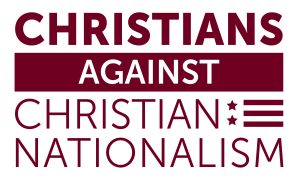 In July 2019 BJC’s Christians Against Christian Nationalism launched the first ecumenical campaign dedicated to addressing Christian nationalism. Nine of the 13 Mainline denominations included here were involved in the creation of the Christians Against Christian Nationalism campaign and are listed as original endorsers.
In July 2019 BJC’s Christians Against Christian Nationalism launched the first ecumenical campaign dedicated to addressing Christian nationalism. Nine of the 13 Mainline denominations included here were involved in the creation of the Christians Against Christian Nationalism campaign and are listed as original endorsers.
In August 2019 a self-avowed Christian nationalist drove from the Dallas suburbs to a Walmart in El Paso and opened fire, killing 22 people. The shooter was motivated by a belief in the “Great Replacement” theory. Seven out of the 13 Mainline denominations issued statements condemning the attack, although many drew attention to gun violence in general as opposed to the specific threat posed by white Christian nationalist ideology.
In October 2019 the National Council of Churches of Christ in the USA issued a statement reaffirming its commitment to interreligious dialogue amid “growing divisiveness and polarization.” The statement noted that “public and sometimes violent acts of racism, white Christian nationalism, anti-immigrant attitudes and xenophobia, along with rising incidents of anti-Jewish, anti-Muslim and other forms of religious bigotry sometimes committed in the name of Christianity, have created an urgency for the churches and the broader culture to recognize the imperative of interreligious engagement for peace-making locally, nationally, and globally.” Twelve of the 13 Mainline denominations are members of the NCC.
In November 2019, 18 civil rights/advocacy groups filed an amicus brief with U.S. Supreme Court supporting the Montana Supreme Court decision that public funds cannot be used for private, religious schools (Espinoza v. Montana Department of Revenue). One of the 13 Mainline denominations signed onto the brief. The U.S. Supreme Court overruled the Montana Supreme Court ruling, opening the door to tax funds being used for religious education.

Ahmaud Arbery
In February 2020, Ahmaud Arbery, a Black man, was murdered by three white men in a racially motivated attack in Georgia. Three out of 13 Mainline denominations issued statements condemning the racist murder of Arbery.
In March 2020, Breonna Taylor, a Black woman, was killed in her home by a white police officer in Louisville, Ky. The Justice Department brought charges against the officer, but the first trial ended in a mistrial.
In March 2020, the federal and state governments issued shutdown orders to combat the spread of COVID-19. The orders pitted individual houses of worship against local and state governments, exacerbating the negative feelings many conservative Christians have about the separation of church and state, which does not give preferential treatment to Christianity. As a result, there was a rise in the number of Christians who became either adherents or supporters of Christian nationalism.
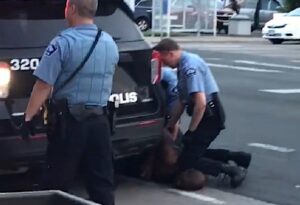
Milwaukee police officers kneeling on George Floyd
In May 2020, George Floyd, a Black man, was murdered by a white Minneapolis police officer. In response, protests — both peaceful and violent — erupted across the country and continued through August. All 13 Mainline denominations issued statements condemning racism following the murder of George Floyd. Some also pointed to the murders of Ahmaud Arbery, Breonna Taylor and others. Like the government-imposed lockdown of churches during the early days of the pandemic, the protests that swept the country months later in the summer of 2020, along with the occasional but very publicized violence that occurred at some of them, hardened and intensified the Christian nationalist stance of many.
In January 2021, the world saw just how dangerous Christian nationalism has become when a mob stormed the U.S. Capitol. All 13 Mainline denominations issued statements. Some explicitly condemned the violence and named it as being Christian nationalist while others issued less pointed public prayers for peace.
In April 2021, the National Council of Churches issued a policy statement, “The Dangers of Christian Nationalism in the United States: A Policy Statement of the National Council of Churches.” Twelve out of the 13 Mainline denominations are members of the NCC.
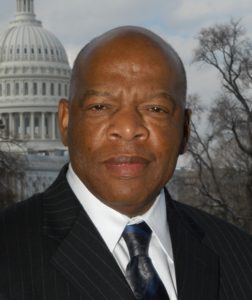
Congressman John Lewis
In May 2021, the John Lewis Every Child Deserves a Family Act of 2021 was introduced in the U.S. House of Representatives. The proposed act prohibits discrimination against LGBTQ people by faith-based foster care agencies that receive federal funding. Multiple individual clergy and congregations from 11 of the 13 denominations signed a letter of support. Only one of the 13 national bodies of the Mainline churches signed.
In February 2022, BJC released a report explicitly calling out the Christian nationalism that fueled the violent January 6 attack.
In May 2022, a white nationalist murdered 10 African Americans at a Tops Friendly Market in Buffalo, N.Y. The shooter was motivated by a belief in the “Great Replacement” theory. Six of the 13 denominations issued statements condemning the murders.
In June 2022, the U.S. Supreme Court ruled in favor of Dobbs in Dobbs v. Jackson Women’s Health Organization, overturning Roe v. Wade and turning back abortion rights. Six of the 13 Mainline denominations issued statements condemning the ruling and its implications for bodily autonomy while two others issued mixed statements reflecting the lack of a unified position within their denominations.
In June 2022, the U.S. Supreme Court in Carson v. Makin ruled that religious schools cannot be excluded from receiving state government funding through school voucher programs.

Joseph Kennedy in a photo provided by his law firm, First Liberty Institute.
In June 2022, the U.S. Supreme Court ruled in favor of Kennedy in Kennedy v. Bremerton School District. The landmark ruling in favor of the Washington public high school football coach says the coach’s religious liberty to lead prayer on the football field is of greater importance than his students’ rights to be free from religious persuasion in the public school system.
In June 2022, the BJC’s Christians Against Christian Nationalism sent a letter to the U.S. House Select Committee to Investigate the January 6 Attack on the United States Capitol imploring them to “thoroughly investigate the role that Christian nationalism played in the attack.” Five of the 13 Mainline denominations signed the letter.
In December 2022, the House released its final report on January 6. Noticeably absent was any attribution to the role Christian nationalism played in the insurrection. According to later reporting, the committee under Rep. Liz Cheney’s direction refused to include anything that could be construed as suggesting “every American who believes God has blessed America is a white supremacist.”
From 2022 to the present in state legislatures across the country, Christian nationalists have continued introducing bills to erode the separation of church and state and install a Christian nationalist understanding of faith in government institutions. At the same time, five of the 13 Mainline denominations have passed binding resolutions condemning Christian nationalism and/or developed programs and materials that individual congregations can use to address Christian nationalism in their communities. One additional denomination issued a nonbinding statement supporting religious freedom.
A denomination-by-denomination accounting
 Alliance of Baptists is one of the three Mainline Baptist denominations supporting Baptist Joint Committee for Religious Liberty. In 2018, the Alliance issued a statement on the Tree of Life murders through the BJC. The Alliance signed the Americans United statement in 2019 supporting the separation of church and state and was an original endorser of the BJC’s Christians Against Christian Nationalism campaign launched in 2019. The Alliance is a member of the NCC, which has issued policy statements against Christian nationalism. In 2020, the Alliance issued a statement condemning the racist murder of Ahmaud Arbery and a second statement condemning racism following the murders of George Floyd, Breonna Taylor, Ahmaud Arbery and Tony McDade. In 2021, multiple clergy from individual Alliance of Baptist churches as well as the national Alliance of Baptists office signed the statement “Faith Leaders for the John Lewis Every Child Deserves a Family Act.” The Alliance also issued a policy statement in advance of the Dobbs decision affirming its commitment “to the protection of all individuals’ reproductive health, including guaranteeing the right to maintain personal bodily autonomy, have children or not have children.”
Alliance of Baptists is one of the three Mainline Baptist denominations supporting Baptist Joint Committee for Religious Liberty. In 2018, the Alliance issued a statement on the Tree of Life murders through the BJC. The Alliance signed the Americans United statement in 2019 supporting the separation of church and state and was an original endorser of the BJC’s Christians Against Christian Nationalism campaign launched in 2019. The Alliance is a member of the NCC, which has issued policy statements against Christian nationalism. In 2020, the Alliance issued a statement condemning the racist murder of Ahmaud Arbery and a second statement condemning racism following the murders of George Floyd, Breonna Taylor, Ahmaud Arbery and Tony McDade. In 2021, multiple clergy from individual Alliance of Baptist churches as well as the national Alliance of Baptists office signed the statement “Faith Leaders for the John Lewis Every Child Deserves a Family Act.” The Alliance also issued a policy statement in advance of the Dobbs decision affirming its commitment “to the protection of all individuals’ reproductive health, including guaranteeing the right to maintain personal bodily autonomy, have children or not have children.”
 American Baptist Churches USA is one of the three Mainline Baptist denominations supporting Baptist Joint Committee for Religious Liberty. In 2018, they issued a statement on the Tree of Life murders through the BJC. The ABC was an original endorser of the BJC’s Christians Against Christian Nationalism campaign launched in 2019 and is a member of the NCC, which has issued policy statements against Christian nationalism. In 2020, the ABC issued a statement condemning racism following the murder of George Floyd. In 2021, the ABC issued a statement condemning the violence on January 6 and calling for President Trump to be held accountable for “sedition.” Also in 2021, multiple clergy from individual churches in the ABC network signed the statement “Faith Leaders for the John Lewis Every Child Deserves a Family Act.” In 2022, the ABC issued a statement condemning the recent gun violence across the country and especially the racist motivations behind the Buffalo murders.
American Baptist Churches USA is one of the three Mainline Baptist denominations supporting Baptist Joint Committee for Religious Liberty. In 2018, they issued a statement on the Tree of Life murders through the BJC. The ABC was an original endorser of the BJC’s Christians Against Christian Nationalism campaign launched in 2019 and is a member of the NCC, which has issued policy statements against Christian nationalism. In 2020, the ABC issued a statement condemning racism following the murder of George Floyd. In 2021, the ABC issued a statement condemning the violence on January 6 and calling for President Trump to be held accountable for “sedition.” Also in 2021, multiple clergy from individual churches in the ABC network signed the statement “Faith Leaders for the John Lewis Every Child Deserves a Family Act.” In 2022, the ABC issued a statement condemning the recent gun violence across the country and especially the racist motivations behind the Buffalo murders.
 Christian Church (Disciples of Christ) issued a statement in 2019 condemning the El Paso murders. Disciples of Christ also signed the Americans United statement that year supporting the separation of church and state and is a member of the NCC, which has issued policy statements against Christian nationalism. In 2020, the Disciples of Christ issued a statement condemning racism following the murder of George Floyd. In 2021, the denomination issued a statement condemning the violence on January 6. Also in 2021, multiple clergy from individual Disciples of Christ churches signed the statement “Faith Leaders for the John Lewis Every Child Deserves a Family Act.” In 2022, the Disciples of Christ issued a statement on the Dobbs decision affirming their historical and ongoing engagement on “the issue of reproductive freedom in all of its complexity, resulting in consistent affirmation of a commitment to reproductive rights for women.” In 2023, the Disciples at their biennial meeting adopted a resolution opposing Christian nationalism. The meeting also offered workshops for clergy and laity to equip them to take a stand in their own communities.
Christian Church (Disciples of Christ) issued a statement in 2019 condemning the El Paso murders. Disciples of Christ also signed the Americans United statement that year supporting the separation of church and state and is a member of the NCC, which has issued policy statements against Christian nationalism. In 2020, the Disciples of Christ issued a statement condemning racism following the murder of George Floyd. In 2021, the denomination issued a statement condemning the violence on January 6. Also in 2021, multiple clergy from individual Disciples of Christ churches signed the statement “Faith Leaders for the John Lewis Every Child Deserves a Family Act.” In 2022, the Disciples of Christ issued a statement on the Dobbs decision affirming their historical and ongoing engagement on “the issue of reproductive freedom in all of its complexity, resulting in consistent affirmation of a commitment to reproductive rights for women.” In 2023, the Disciples at their biennial meeting adopted a resolution opposing Christian nationalism. The meeting also offered workshops for clergy and laity to equip them to take a stand in their own communities.
 Church of the Brethren issued a statement in 2019 condemning the El Paso murders. Church of the Brethren is a member of the NCC, which has issued policy statements against Christian nationalism. In 2020, they issued a statement condemning racism following the murders of George Floyd, Ahmaud Arbery and Breonna Taylor. In 2021, Church of the Brethren issued a statement condemning the violence on January 6. Also in 2021, multiple clergy from individual Church of the Brethren churches signed the statement “Faith Leaders for the John Lewis Every Child Deserves a Family Act.”
Church of the Brethren issued a statement in 2019 condemning the El Paso murders. Church of the Brethren is a member of the NCC, which has issued policy statements against Christian nationalism. In 2020, they issued a statement condemning racism following the murders of George Floyd, Ahmaud Arbery and Breonna Taylor. In 2021, Church of the Brethren issued a statement condemning the violence on January 6. Also in 2021, multiple clergy from individual Church of the Brethren churches signed the statement “Faith Leaders for the John Lewis Every Child Deserves a Family Act.”
 Cooperative Baptist Fellowship is one of the Baptist denominations behind Baptist Joint Committee for Religious Liberty. In 2018, they issued a statement through the BJC condemning the Tree of Life murders. CBF also issued its own statements condemning the Tree of Life and El Paso murders. CBF was an original endorser of the BJC’s Christians Against Christian Nationalism campaign launched in 2019. In 2020, CBF issued a statement condemning the racist murder of Ahmaud Arbery and a second statement condemning racism following the murders George Floyd, Breonna Taylor and Ahmaud Arbery. In 2021, CBF issued a statement condemning the violence on January 6. In 2022, CBF signed the statement from Christians Against Christian Nationalism asking the U.S. House Committee to thoroughly investigate the role Christian nationalism played in the attack on the U.S. Capitol.
Cooperative Baptist Fellowship is one of the Baptist denominations behind Baptist Joint Committee for Religious Liberty. In 2018, they issued a statement through the BJC condemning the Tree of Life murders. CBF also issued its own statements condemning the Tree of Life and El Paso murders. CBF was an original endorser of the BJC’s Christians Against Christian Nationalism campaign launched in 2019. In 2020, CBF issued a statement condemning the racist murder of Ahmaud Arbery and a second statement condemning racism following the murders George Floyd, Breonna Taylor and Ahmaud Arbery. In 2021, CBF issued a statement condemning the violence on January 6. In 2022, CBF signed the statement from Christians Against Christian Nationalism asking the U.S. House Committee to thoroughly investigate the role Christian nationalism played in the attack on the U.S. Capitol.
![]() Episcopal Church issued a denominational statement in 2018 condemning the Tree of Life murders and individual bishops issued statements condemning the 2019 El Paso murders. The Episcopal Church signed the Americans United statement in 2019 supporting the separation of church and state and was an original endorser of BJC’s Christians Against Christian Nationalism campaign in 2019. The Episcopal Church is a member of the NCC, which has issued policy statements against Christian nationalism. In 2020, individual clergy issued statements condemning the murder of George Floyd. In 2021, the presiding bishop issued a statement condemning the “coup attempt” on January 6. Multiple clergy from individual Episcopal churches signed the statement “Faith Leaders for the John Lewis Every Child Deserves a Family Act.” In 2022, the Episcopal Church issued a statement condemning the racist Buffalo murders. They issued a statement following the Dobbs decision maintaining their theological position “that access to equitable health care, including reproductive health care and reproductive procedures, is ‘an integral part of a woman’s struggle to assert her dignity and worth as a human being.’” That same year they also signed the statement from Christians Against Christian Nationalism asking the U.S. House Committee to thoroughly investigate the role Christian nationalism played in the attack on the U.S. Capitol. In 2022, the Episcopal Church also launched a series on deradicalization aimed at equipping congregations to address Christian nationalism in their midst.
Episcopal Church issued a denominational statement in 2018 condemning the Tree of Life murders and individual bishops issued statements condemning the 2019 El Paso murders. The Episcopal Church signed the Americans United statement in 2019 supporting the separation of church and state and was an original endorser of BJC’s Christians Against Christian Nationalism campaign in 2019. The Episcopal Church is a member of the NCC, which has issued policy statements against Christian nationalism. In 2020, individual clergy issued statements condemning the murder of George Floyd. In 2021, the presiding bishop issued a statement condemning the “coup attempt” on January 6. Multiple clergy from individual Episcopal churches signed the statement “Faith Leaders for the John Lewis Every Child Deserves a Family Act.” In 2022, the Episcopal Church issued a statement condemning the racist Buffalo murders. They issued a statement following the Dobbs decision maintaining their theological position “that access to equitable health care, including reproductive health care and reproductive procedures, is ‘an integral part of a woman’s struggle to assert her dignity and worth as a human being.’” That same year they also signed the statement from Christians Against Christian Nationalism asking the U.S. House Committee to thoroughly investigate the role Christian nationalism played in the attack on the U.S. Capitol. In 2022, the Episcopal Church also launched a series on deradicalization aimed at equipping congregations to address Christian nationalism in their midst.
 Evangelical Lutheran Church in America issued a statement in 2018 condemning the Tree of Life murders. ELCA was an original endorser of BJC’s Christians Against Christian Nationalism campaign in 2019. The ELCA is a member of the NCC, which has issued policy statements against Christian nationalism. In 2020, the ELCA issued a statement condemning racism following the murders of Ahmaud Arbery, Breonna Taylor, Dreasjon (Sean) Reed and George Floyd. The presiding bishop of the ELCA issued a video statement condemning the violence of January 6 and praying for the safety of their ecumenical and interreligious partners. In 2021, multiple clergy from individual ELCA churches signed the statement “Faith Leaders for the John Lewis Every Child Deserves a Family Act.” In 2022, the ELCA issued a statement condemning the Buffalo murders, calling them an outgrowth of white supremacy. They issued a statement following the Dobbs decision pointing to their social teachings as a framework to balance “holding in tension both the strong Christian presumption to preserve and protect all life as well as the complex moral situations in which pregnancy sometimes occurs.” They also signed the statement from Christians Against Christian Nationalism asking the U.S. House Committee to thoroughly investigate the role Christian nationalism played in the attack on the U.S. Capitol. In 2024, the ELCA rolled out a denominational position statement explaining and condemning Christian nationalism as well as a six-session study to educate church members on living faithfully within a pluralistic democracy. The ELCA also devoted its June/July issue of Journal of Lutheran Ethics to responding to Christian nationalism and are drafting a denominational “Social Statement on Civic Life and Faith” to be adopted at their churchwide assembly in 2025.
Evangelical Lutheran Church in America issued a statement in 2018 condemning the Tree of Life murders. ELCA was an original endorser of BJC’s Christians Against Christian Nationalism campaign in 2019. The ELCA is a member of the NCC, which has issued policy statements against Christian nationalism. In 2020, the ELCA issued a statement condemning racism following the murders of Ahmaud Arbery, Breonna Taylor, Dreasjon (Sean) Reed and George Floyd. The presiding bishop of the ELCA issued a video statement condemning the violence of January 6 and praying for the safety of their ecumenical and interreligious partners. In 2021, multiple clergy from individual ELCA churches signed the statement “Faith Leaders for the John Lewis Every Child Deserves a Family Act.” In 2022, the ELCA issued a statement condemning the Buffalo murders, calling them an outgrowth of white supremacy. They issued a statement following the Dobbs decision pointing to their social teachings as a framework to balance “holding in tension both the strong Christian presumption to preserve and protect all life as well as the complex moral situations in which pregnancy sometimes occurs.” They also signed the statement from Christians Against Christian Nationalism asking the U.S. House Committee to thoroughly investigate the role Christian nationalism played in the attack on the U.S. Capitol. In 2024, the ELCA rolled out a denominational position statement explaining and condemning Christian nationalism as well as a six-session study to educate church members on living faithfully within a pluralistic democracy. The ELCA also devoted its June/July issue of Journal of Lutheran Ethics to responding to Christian nationalism and are drafting a denominational “Social Statement on Civic Life and Faith” to be adopted at their churchwide assembly in 2025.
 Moravian Church in America. Moravian Church Northern Province was an original endorser of BJC’s Christians Against Christian Nationalism campaign launched in 2019. The church is a member of the NCC, which has issued policy statements against Christian nationalism. In 2020, the Moravian Church Worldwide issued a statement (signed by Moravian Church in America leaders) condemning racism following the murder of George Floyd. In 2021, the Moravian Church issued a statement asking for peace on January 6. In 2024, the Moravian Church in America launched a five-week Bible study called “Being a Christian Citizen,” intended to address the appropriate relationship between membership within the church and the state.
Moravian Church in America. Moravian Church Northern Province was an original endorser of BJC’s Christians Against Christian Nationalism campaign launched in 2019. The church is a member of the NCC, which has issued policy statements against Christian nationalism. In 2020, the Moravian Church Worldwide issued a statement (signed by Moravian Church in America leaders) condemning racism following the murder of George Floyd. In 2021, the Moravian Church issued a statement asking for peace on January 6. In 2024, the Moravian Church in America launched a five-week Bible study called “Being a Christian Citizen,” intended to address the appropriate relationship between membership within the church and the state.
 Presbyterian Church (USA) issued statements condemning The Tree of Life (2018) and El Paso (2019) murders. The PCUSA signed the Americans United statement in 2019 supporting the separation of church and state, testified before the U.S. House of Representatives in support of the “Do No Harm Act,” signed onto the amicus brief in Espinoza v. Montana Department of Revenue and was an original endorser of BJC’s Christians Against Christian Nationalism campaign in 2019. PCUSA is a member of the NCC, which has issued policy statements against Christian nationalism. In 2020 the PCUSA issued a statement on racial truth and reconciliation following the murders of Ahmaud Arbery, Breonna Taylor, Tony McDade, George Floyd and Rayshard Brooks. In 2021, multiple clergy from individual PC(USA) churches signed the statement “Faith Leaders for the John Lewis Every Child Deserves a Family Act.” In 2022, the PC(USA) issued a statement condemning the violence in Laguna Woods, Calif., and Buffalo, N.Y., and calling for an end to hatred. Following the Dobbs decision, they issued a statement and their General Assembly (which was meeting at the time) approved by 348-38 a resolution affirming “that women and pregnant people are full moral agents, created in the image of God, and it supports their moral capacity to decide whether to continue or end any given pregnancy.” The PC(USA) also signed the statement from Christians Against Christian Nationalism asking the U.S. House Committee to thoroughly investigate the role Christian nationalism played in the attack on the U.S. Capitol. In 2024, the 226th General Assembly of the PC(USA) passed resolutions including a public confession on “the complicity of PC(USA) in the emergence and expansion of a U.S. civic religion, Christian in tone and content, that not only conflates church and state, but also succumbs to idolatries of national and racial identities.” The General Assembly also passed resolutions directing the Advisory Committee on Social Witness Policy to craft a new policy for the church that condemns Christian nationalism and directing the Presbyterian Mission Agency and the Presbyterian Publishing House “to develop materials — for worship, Sunday schools, programmatic events — that equip individuals and congregations with resources to deconstruct practices, theologies, and patterns of (white Christian nationalism] in the church and society at large.”
Presbyterian Church (USA) issued statements condemning The Tree of Life (2018) and El Paso (2019) murders. The PCUSA signed the Americans United statement in 2019 supporting the separation of church and state, testified before the U.S. House of Representatives in support of the “Do No Harm Act,” signed onto the amicus brief in Espinoza v. Montana Department of Revenue and was an original endorser of BJC’s Christians Against Christian Nationalism campaign in 2019. PCUSA is a member of the NCC, which has issued policy statements against Christian nationalism. In 2020 the PCUSA issued a statement on racial truth and reconciliation following the murders of Ahmaud Arbery, Breonna Taylor, Tony McDade, George Floyd and Rayshard Brooks. In 2021, multiple clergy from individual PC(USA) churches signed the statement “Faith Leaders for the John Lewis Every Child Deserves a Family Act.” In 2022, the PC(USA) issued a statement condemning the violence in Laguna Woods, Calif., and Buffalo, N.Y., and calling for an end to hatred. Following the Dobbs decision, they issued a statement and their General Assembly (which was meeting at the time) approved by 348-38 a resolution affirming “that women and pregnant people are full moral agents, created in the image of God, and it supports their moral capacity to decide whether to continue or end any given pregnancy.” The PC(USA) also signed the statement from Christians Against Christian Nationalism asking the U.S. House Committee to thoroughly investigate the role Christian nationalism played in the attack on the U.S. Capitol. In 2024, the 226th General Assembly of the PC(USA) passed resolutions including a public confession on “the complicity of PC(USA) in the emergence and expansion of a U.S. civic religion, Christian in tone and content, that not only conflates church and state, but also succumbs to idolatries of national and racial identities.” The General Assembly also passed resolutions directing the Advisory Committee on Social Witness Policy to craft a new policy for the church that condemns Christian nationalism and directing the Presbyterian Mission Agency and the Presbyterian Publishing House “to develop materials — for worship, Sunday schools, programmatic events — that equip individuals and congregations with resources to deconstruct practices, theologies, and patterns of (white Christian nationalism] in the church and society at large.”
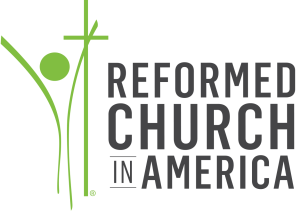 Reformed Church in America is a member of the NCC, which has issued policy statements against Christian nationalism. In 2020, the RCA issued a statement condemning racism following the murder of George Floyd. In 2021, multiple clergy from individual RCA churches signed the statement “Faith Leaders for the John Lewis Every Child Deserves a Family Act.”
Reformed Church in America is a member of the NCC, which has issued policy statements against Christian nationalism. In 2020, the RCA issued a statement condemning racism following the murder of George Floyd. In 2021, multiple clergy from individual RCA churches signed the statement “Faith Leaders for the John Lewis Every Child Deserves a Family Act.”
 Religious Society of Friends (Quakers) communities and the Friends Council on Education issued statements condemning the Tree of Life murders in 2018. The Religious Society of Friends was an original endorser of BJC’s Christians Against Christian Nationalism campaign in 2019 and is a member of the NCC, which has issued policy statements against Christian nationalism. In 2020, multiple Quaker communities issued statements condemning racism following the murders of George Floyd, Breonna Taylor, Tony McDade, Ahmaud Arbery, David McAtee, James Scurlock, Nina Pop and others. In 2021 one Quaker community signed the statement Faith Leaders for the John Lewis Every Child Deserves a Family Act. Following the Dobbs decision in 2022, the Quakers issued a statement acknowledging that they do not have a unified position on abortion access and continue to be in discernment on the issue.
Religious Society of Friends (Quakers) communities and the Friends Council on Education issued statements condemning the Tree of Life murders in 2018. The Religious Society of Friends was an original endorser of BJC’s Christians Against Christian Nationalism campaign in 2019 and is a member of the NCC, which has issued policy statements against Christian nationalism. In 2020, multiple Quaker communities issued statements condemning racism following the murders of George Floyd, Breonna Taylor, Tony McDade, Ahmaud Arbery, David McAtee, James Scurlock, Nina Pop and others. In 2021 one Quaker community signed the statement Faith Leaders for the John Lewis Every Child Deserves a Family Act. Following the Dobbs decision in 2022, the Quakers issued a statement acknowledging that they do not have a unified position on abortion access and continue to be in discernment on the issue.
 United Church of Christ issued statements condemning the Tree of Life (2018) and El Paso (2019) murders. The UCC signed the Americans United statement in 2019 supporting the separation of church and state and was an original endorser of the BJC’s Christians Against Christian Nationalism campaign launched in 2019. The UCC is a member of the NCC which has issued policy statements against Christian nationalism. In 2020 the UCC issued a powerful statement against racism following the “lynchings” of Ahmaud Arbery, Breonna Taylor and George Floyd. In 2021, the UCC issued another powerful statement condemning the violence of January 6 as a “racist takeover of the U.S. Capitol.” Also in 2021, multiple clergy from UCC churches signed the statement “Faith Leaders for the John Lewis Every Child Deserves a Family Act.” In 2022, the UCC issued a statement condemning the racist Buffalo murders. They issued a statement condemning the Dobbs decision. They also signed the statement from Christians Against Christian Nationalism asking the U.S. House Committee to thoroughly investigate the role Christian nationalism played in the attack on the U.S. Capitol.
United Church of Christ issued statements condemning the Tree of Life (2018) and El Paso (2019) murders. The UCC signed the Americans United statement in 2019 supporting the separation of church and state and was an original endorser of the BJC’s Christians Against Christian Nationalism campaign launched in 2019. The UCC is a member of the NCC which has issued policy statements against Christian nationalism. In 2020 the UCC issued a powerful statement against racism following the “lynchings” of Ahmaud Arbery, Breonna Taylor and George Floyd. In 2021, the UCC issued another powerful statement condemning the violence of January 6 as a “racist takeover of the U.S. Capitol.” Also in 2021, multiple clergy from UCC churches signed the statement “Faith Leaders for the John Lewis Every Child Deserves a Family Act.” In 2022, the UCC issued a statement condemning the racist Buffalo murders. They issued a statement condemning the Dobbs decision. They also signed the statement from Christians Against Christian Nationalism asking the U.S. House Committee to thoroughly investigate the role Christian nationalism played in the attack on the U.S. Capitol.
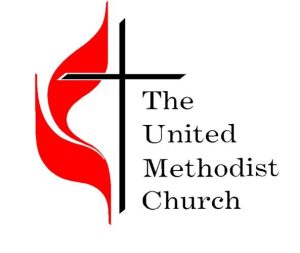 United Methodist Church individual clergy, laity and bishops issued statements condemning the Tree of Life murders in 2018. The Council of Bishops issued a statement on behalf of the denomination condemning the El Paso murders in 2019. The UMC signed the Americans United statement in 2019 supporting the separation of church and state and is a member of the NCC, which has issued policy statements against Christian nationalism. In 2020, the Council of Bishops issued a statement condemning the racist murder of Ahmaud Arbery and a second statement calling for United Methodists to peacefully and prayerfully fight racism in the wake of George Floyd’s murder. Following the January 6 riot, they issued a statement calling for peaceful engagement in these challenging times. Also in 2021, multiple clergy from individual UMC churches signed the statement “Faith Leaders for the John Lewis Every Child Deserves a Family Act.” In 2022, individual clergy, laity and bishops issued statements condemning the Buffalo murders. The church also issued a statement on the Dobbs decision expressing the denomination’s conflicted stance but also noting “these restrictions deny the basic right to lifesaving care that everybody has the right to access and receive.” In 2024, the United Methodist Church’s General Board of Church and Society issued a nonbinding statement reminding Methodist communities of the UMC’s position in support of religious freedom.
United Methodist Church individual clergy, laity and bishops issued statements condemning the Tree of Life murders in 2018. The Council of Bishops issued a statement on behalf of the denomination condemning the El Paso murders in 2019. The UMC signed the Americans United statement in 2019 supporting the separation of church and state and is a member of the NCC, which has issued policy statements against Christian nationalism. In 2020, the Council of Bishops issued a statement condemning the racist murder of Ahmaud Arbery and a second statement calling for United Methodists to peacefully and prayerfully fight racism in the wake of George Floyd’s murder. Following the January 6 riot, they issued a statement calling for peaceful engagement in these challenging times. Also in 2021, multiple clergy from individual UMC churches signed the statement “Faith Leaders for the John Lewis Every Child Deserves a Family Act.” In 2022, individual clergy, laity and bishops issued statements condemning the Buffalo murders. The church also issued a statement on the Dobbs decision expressing the denomination’s conflicted stance but also noting “these restrictions deny the basic right to lifesaving care that everybody has the right to access and receive.” In 2024, the United Methodist Church’s General Board of Church and Society issued a nonbinding statement reminding Methodist communities of the UMC’s position in support of religious freedom.

Mara Bim
Mara Richards Bim serves as a Clemons Fellow with BNG and as program director at Faith Commons. She is a spiritual director and a recent master of divinity degree graduate from Perkins School of Theology at SMU. She also is an award-winning theater artist and founder of the nationally acclaimed Cry Havoc Theater Company which operated in Dallas from 2014 to 2023.

